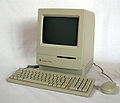Wikipedia:Today's featured article/requests/OK Computer
OK Computer[edit]
Previous nomination
|
|---|
The result was: not scheduled by Jimfbleak - talk to me? 13:57, 29 April 2017 (UTC) OK Computer is the third studio album by English alternative rock band Radiohead, released in 1997 on EMI subsidiaries Parlophone and Capitol Records. The band made a deliberate attempt to distance themselves from the guitar-oriented, lyrically introspective style of prior works like The Bends. OK Computer's abstract lyrics, densely layered sound and eclectic range of influences laid the groundwork for the more experimental style Radiohead adopted beginning with their next album, Kid A. Initially, record label executives feared the album would be difficult to market due to its progressive sound and apparent lack of hit singles. However, the album reached number one on the UK Albums Chart and became the band's highest album entry on the American charts at the time, debuting at number 21 on the Billboard 200. Critics and fans have noted that the album's lyrics and music depict a world fraught with rampant consumerism, social alienation, emotional isolation and political malaise; in this capacity, it is often interpreted as having prescient insight into the mood of 21st-century life. (Full article...)
|
- This is the archived discussion of the TFAR nomination for the article below. Subsequent comments should be made on the appropriate discussion page (such as Wikipedia talk:Today's featured article/requests). Please do not modify this page.
The result was: scheduled for Wikipedia:Today's featured article/June 16, 2017 by Mike Christie (talk - contribs - library) 12:34, 27 May 2017 (UTC)
OK Computer is the third studio album by English alternative rock band Radiohead, released in 1997 on EMI subsidiaries Parlophone and Capitol Records. The band made a deliberate attempt to distance themselves from the guitar-oriented, lyrically introspective style of prior works like The Bends. OK Computer's abstract lyrics, densely layered sound and eclectic range of influences laid the groundwork for the more experimental style Radiohead adopted beginning with their next album, Kid A. Initially, record label executives feared the album would be difficult to market due to its progressive sound and apparent lack of hit singles. However, the album reached number one on the UK Albums Chart and became the band's highest album entry on the American charts at the time, debuting at number 21 on the Billboard 200. Critics and fans have noted that the album's lyrics and music depict a world fraught with rampant consumerism, social alienation, emotional isolation and political malaise; in this capacity, it is often interpreted as having prescient insight into the mood of 21st-century life. (Full article...)
- Most recent similar article(s): All popular music recents from the last year (other than albums): Here We Go Again (Ray Charles song) (May 20), The Greencards (April 27), Courtney Love (April 2), Powderfinger (March 16), Mothers of the Disappeared (March 9), Viking metal (March 1), New wave of British heavy metal (January 27), No Me Queda Más (December 30), Under the Bridge (December 14), Angel of Death (Slayer song) (October 7), Diamonds (Rihanna song) (September 27)
- All album recents from the last year: The Pale Emperor (January 15), Agharta (album) (November 14), The Seduction of Ingmar Bergman (August 14), Christ Illusion (August 8), Aaliyah (album) (July 8), Sons of Soul (June 22)
- Main editors: Brandt Luke Zorn
- Promoted: October 10, 2012
- Reasons for nomination: June 16 will be the 20th anniversary of the release of OK Computer in Radiohead's home country, the United Kingdom.
- Support as nominator. —BLZ · talk 21:19, 2 May 2017 (UTC)
- Y'know, this really sucks, because I was hoping to present Fightstar to a communications class on the front page of Wikipedia before I graduate high school. Provided the FAC passes, it would be about a week before this is scheduled. It just makes me sad cause I think this would be too similar (as it's a music topic and all). I will not oppose for selfish reasons, however; so if this gets more supports talk to me again. This was an excellent album and is one I happen to own (I have Amnesiac too). dannymusiceditor Speak up! 00:01, 6 May 2017 (UTC)
- Support as prior nominator. --Sunshineisles2 (talk) 00:46, 14 May 2017 (UTC)






